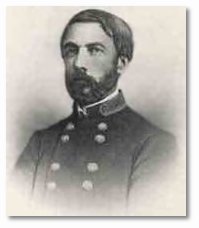|
|
|
MAIN MENU |
| Home |
| Civil War Battles |
|
TIMELINE |
| 1860 |
| 1861 |
| 1862 |
| 1863 |
| 1864 |
| 1865 |
|
VETERANS |
| Honor A Veteran |
| View Veterans |
| Women In The War |
|
MUSIC |
| Union |
| Confederate |
|
UNIFORMS |
| Union |
| Confederate |
|
WEAPONS |
| Union |
| Confederate |
|
CONTACT US |
| Guestbook |
CIVIL WAR VETERANS - Daniel Harvey Hill
Biography:
Lt. General Daniel Harvey Hill was born at Hill's Iron Works in South Carolina on July 12, 1821. His grandfather, a native of Ireland, had built an iron foundry in York district where cannons were cast for the Continental Army, until it was destroyed by the British.
Daniel H. Hill was a graduate of West Point military academy in 1842. A class member of James Longstreet, A.P. Stewart, G.W. Smith, R.H. Anderson, and Van Dorn, his first service was on the Maine frontier. He fought in nearly every important engagement during the Mexican War, and gained notice for his conspicuous courage. He soon rose to the rank of 1st Lieutenant. When his State legislature voted swords to the three bravest survivors of the war, one was awarded to Hill. In 1848, he served at Fortress Monroe.
On Feb. 28, 1849, he resigned from the Army to accept a professorship of mathematics at Washington College, Virginia. He was married in 1852. In 1854, he became a professor at Davidson College, North Carolina.
Hill was impressed with the duty of preparing the South for defense, and in 1859 he accepted the position of commandant and manager of the military institute at Charlotte, N.C. During this period he authored several educational and theological works. He led his cadets to Raleigh, making drill masters of them.
He was permitted to select 12 of his best North Carolina Volunteers in his first regiment, where he was commissioned Colonel. He and his regiment were sent to command the defenses of Yorktown. He won the first battle of the war at Bethel. He later wrote to his wife, "I was baptized and worshiped 'till I was 16 years old, the church of my Mother."
In September, 1861, he was promoted to Brigadier General, and assigned to the command of the N.C. coast. At Leesburg, he was in command of the left, and being promoted Major General, was in command of the first division of Johnston's army to enter Yorktown, and the last to leave. At Williamsburg his men were distinguished, and at Seven Pines Longstreet reported, "The conduct of the attack was left entirely to Major-General Hill."
He took part in the battle of Mechanicsville, and at Gaine's Mill he struck a decisive blow on the enemy's right. At Malvern Hill his gallant attack was rendered partly fruitless by a lack of support. During the Manassas campaign he held the Federals in check at Fredericksburg, and during Sharpsburg he commanded the 4,000 men who held the pass at Crampton's Gap. While fighting at Sharpsburg, three horses were killed under him.
In February, 1863, he resumed command in North Carolina and was making demonstrations when he was called to Petersburg. He guarded the capital and repelled the advance of General Dix. On July 10th, he was appointed Lieutenant General and put in command of the divisions of Cleburne and Breckinridge.
While at Chackamauga, he took charge of the forward movement of three lines, which swept of the breastworks of Thomas and caught 5,000 prisoners. With Longstreet and Forrest, he endeavored to reap the fruits of the fighting on that bloody field, but they were doomed to disappointment. Unmerited accused of too much prominence in the petition for the removal of the commanding general, he was relieved of command. He would later volunteer on the staffs of Beauregard, Hoke, and finally at the urgent request of Johnston and Beauregard he was assigned to duty in Charleston, and to the command of a remnant of the Army of Tennessee in its retreat before Sheridan.
|

